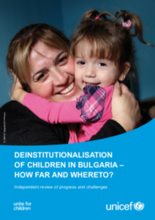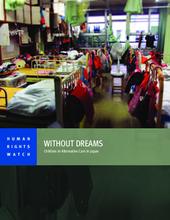Displaying 391 - 400 of 662
This Review, commissioned by UNICEF Bulgaria, is aimed at informing the recommendations for the Bulgarian Government’s Action Plan for the implementation of the National Strategy ‘Vision for Deinstitutionalisation of Children in Bulgaria.’
This report by Human Rights Watch examines Japan’s alternative care system for children. It describes its organization and processes, presents current data on the use of different forms of alternative care and highlights the problems found in the institutionalization of most children (including infants), as well as abuses that take place in the system.
This paper examines the work Open Society Foundations have done in Croatia as part of its Mental Health Initiative (MHI), with the goal of helping people with disabilities return to their communities where they are supported by family and friends.
Save the Children has released a policy brief outlining its position on the institutional care of children.
This article reviews a new book by Charles A. Nelson, Nathan A. Fox and Charles H. Zeanah who conducted seminal studies in Romania on children who were institutionalised, comparing their developmental and well-being outcomes to children who were placed in foster care or adoptive families.
Infant Mental Health Journal has published an important Special Issue on Global Research, Practice, and Policy Issues in the Care of Infants and Young Children at Risk. This article describes the adverse mental health effects of violence and abuse in an institution in Tanzania.
Infant Mental Health Journal has published an important Special Issue on Global Research, Practice, and Policy Issues in the Care of Infants and Young Children at Risk. In this article, behavior problems were studied in fifty 5- to 8-year-old children transferred from a socioemotionally depriving Russian institution to domestic families.
Infant Mental Health Journal has published an important Special Issue on Global Research, Practice, and Policy Issues in the Care of Infants and Young Children at Risk. This article reports on a quasi-experimental study commissioned by the Chilean government that had two general aims: (a) to assess infants’ psychoaffective developmental levels and (b) to evaluate whether an intervention based on the promotion of socioemotional development modifies the infant's psychoaffective development.
Infant Mental Health Journal has published an important Special Issue on Global Research, Practice, and Policy Issues in the Care of Infants and Young Children at Risk. In this study the authors assessed internalizing disorders, externalizing disorders, and attention deficit hyperactivity disorder (ADHD) in 54-month-old children living with foster families in Bucharest, Romania.
This introductory article of a Special Issue of Infant Mental Health Journal on Global Research, Practice, and Policy Issues in the Care of Infants and Young Children at Risk provides a useful overview, placing the articles in the broader contexts of research on institutionalized children and different initiatives to prevent inappropriate care, either through addressing the quality of the care provided or ensuring the appropriateness of the type of care environment provided.




